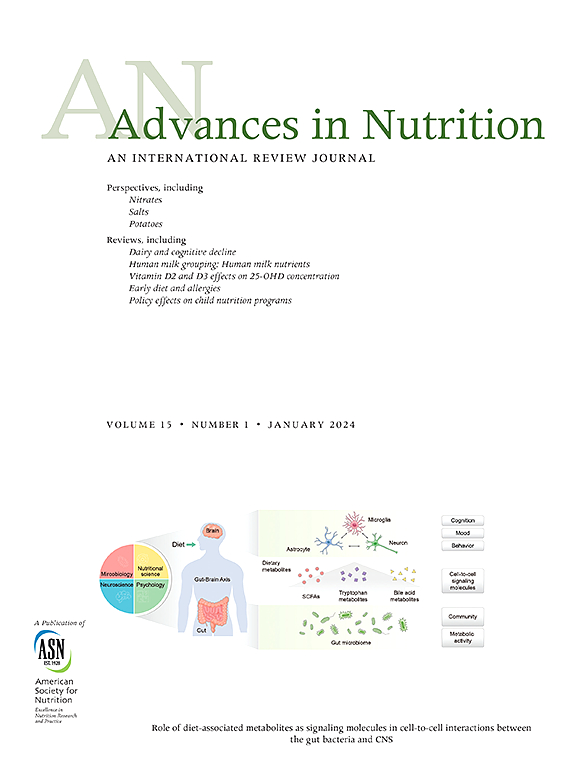Seafood During Pregnancy and Lactation and Child Neurocognitive Development: A Systematic Review
IF 9.2
1区 医学
Q1 NUTRITION & DIETETICS
引用次数: 0
Abstract
Background
Assessing seafood as a food group, rather than as a source of omega-3 fatty acids or contaminants, may better inform dietary guidance for pregnancy and lactation.
Objectives
This study aims to assess relationships between seafood consumption during pregnancy and lactation and neurocognitive development in the child.
Methods
Three electronic databases were searched up to September 2024 to update a previous search from 2000 to 2019. Articles were included if seafood intake during pregnancy or lactation and a child outcome was assessed [neurocognitive development including cognitive, social–emotional, behavioral, movement/physical, language/communication, and aggregate scores as well as depression, anxiety, attention-deficit/hyperactivity disorder (ADHD), and autism spectrum disorder (ASD)]. Articles were screened at title, abstract, and full-text levels independently by 2 analysts. Data were extracted, quality checked, and synthesized narratively considering the direction, magnitude, and statistical significance of results. The risk of bias was assessed using study design-specific tools. Certainty of evidence was assessed using Grading of Recommendations Assessment, Development and Evaluations.
Results
Forty articles [1 randomized controlled trial (RCT), 24 prospective cohorts, and 1 retrospective cohort] during pregnancy were identified; none for lactation. Evidence suggested relationships between higher seafood consumption and better social–emotional and behavioral development in children and adolescents aged 0–18 y as well as better aggregate scores of development for those <4 y. The certainty of the evidence was very low to moderate due to the lack of RCTs. Evidence for overall cognitive development was inconsistent but higher seafood may be related to better attention, reasoning and problem-solving, and verbal intelligence. However, evidence was limited in the number of studies and ages assessed. Evidence was inconsistent for movement/physical and language/communication development, and a paucity of studies was found for ADHD and ASD.
Conclusions
Seafood consumption within currently recommended amounts during pregnancy may be associated with better social–emotional, behavioral, and aggregate scores of development in the child, as well as potentially some aspects of cognitive development.
This study was registered at PROSPERO as CRD42023432844.
孕期和哺乳期海鲜与儿童神经认知发展:系统综述
将海产品作为一种食物,而不是作为omega-3脂肪酸或污染物的来源进行评估,可能会更好地为孕期和哺乳期的饮食指导提供信息。目的本研究旨在评估孕期和哺乳期海鲜消费与儿童神经认知发育之间的关系。方法检索截至2024年9月的3个电子数据库,更新2000 - 2019年的检索结果。如果评估怀孕或哺乳期间的海鲜摄入量和儿童结局[神经认知发展,包括认知、社会情感、行为、运动/身体、语言/沟通、总分以及抑郁、焦虑、注意力缺陷/多动障碍(ADHD)和自闭症谱系障碍(ASD)],则纳入文章。文章分别由两位分析人员在标题、摘要和全文三个层面进行筛选。对数据进行提取、质量检查,并综合考虑结果的方向、幅度和统计意义。使用研究设计专用工具评估偏倚风险。证据的确定性采用建议分级评估、发展和评估进行评估。结果共纳入孕期文献40篇[1篇随机对照试验(RCT), 24篇前瞻性队列,1篇回顾性队列];哺乳期不用。有证据表明,在0-18岁的儿童和青少年中,较高的海鲜消费与更好的社会情感和行为发展之间存在关系,并且在4岁的儿童和青少年中有更好的发展总分。由于缺乏随机对照试验,证据的确定性非常低至中等。整体认知发展的证据并不一致,但更高的海鲜可能与更好的注意力、推理和解决问题的能力以及语言智力有关。然而,证据在研究数量和评估年龄方面是有限的。关于运动/身体和语言/交流发展的证据不一致,并且缺乏关于ADHD和ASD的研究。结论:在怀孕期间食用目前推荐量的海鲜可能与儿童更好的社会情感、行为和总体发展得分有关,并且可能与认知发展的某些方面有关。本研究在普洛斯彼罗注册为CRD42023432844。
本文章由计算机程序翻译,如有差异,请以英文原文为准。
求助全文
约1分钟内获得全文
求助全文
来源期刊

Advances in Nutrition
医学-营养学
CiteScore
17.40
自引率
2.20%
发文量
117
审稿时长
56 days
期刊介绍:
Advances in Nutrition (AN/Adv Nutr) publishes focused reviews on pivotal findings and recent research across all domains relevant to nutritional scientists and biomedical researchers. This encompasses nutrition-related research spanning biochemical, molecular, and genetic studies using experimental animal models, domestic animals, and human subjects. The journal also emphasizes clinical nutrition, epidemiology and public health, and nutrition education. Review articles concentrate on recent progress rather than broad historical developments.
In addition to review articles, AN includes Perspectives, Letters to the Editor, and supplements. Supplement proposals require pre-approval by the editor before submission. The journal features reports and position papers from the American Society for Nutrition, summaries of major government and foundation reports, and Nutrient Information briefs providing crucial details about dietary requirements, food sources, deficiencies, and other essential nutrient information. All submissions with scientific content undergo peer review by the Editors or their designees prior to acceptance for publication.
 求助内容:
求助内容: 应助结果提醒方式:
应助结果提醒方式:


